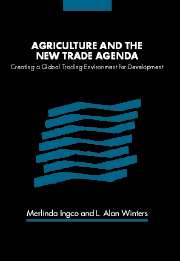Book contents
- Frontmatter
- Contents
- List of figures, tables, and boxes
- List of contributors
- Preface
- List of abbreviations
- 1 Introduction
- 2 Agriculture and the trade negotiations: a synopsis
- Part I Experience and lessons from the implementation of WTO agreements
- Part II Interests, options, and objectives in a new trade round
- Part III New trade rules and quantitative assessments of future liberalization options
- Part IV New trade issues and developing country agriculture
- Author index
- Subject index
Preface
Published online by Cambridge University Press: 27 February 2010
- Frontmatter
- Contents
- List of figures, tables, and boxes
- List of contributors
- Preface
- List of abbreviations
- 1 Introduction
- 2 Agriculture and the trade negotiations: a synopsis
- Part I Experience and lessons from the implementation of WTO agreements
- Part II Interests, options, and objectives in a new trade round
- Part III New trade rules and quantitative assessments of future liberalization options
- Part IV New trade issues and developing country agriculture
- Author index
- Subject index
Summary
It is beyond debate that the agricultural negotiations taking place under the WTO's Doha Development Agenda are simultaneously hugely important, complex, and sensitive. Deep interests are at stake in both developing and developed countries and the precise nature of the current instruments of international trade policy rather poorly understood. The factual basis on which to consider any proposed requests or offers in the talks is often lacking, and negotiators are often unsure where their countries' true interests lie on crucial issues. For example, who gains from the current complex system of tariff quotas, what will happen to world prices if agricultural trade is liberalized, how can the activities of state-trading companies (STCs) be assessed, and how large and how warranted a barrier to trade are sanitary and phytosanitary standards (SPS)?
Experience in previous negotiations shows that progress is severely hampered if negotiators do not understand their own interests (or feel that they do not) – and, of course, there is a greater possibility of concluding a harmful or unfair agreement in such circumstances. This is particularly relevant for smaller developing countries which usually do not have the analytical resources or depth of representation in the talks to keep themselves fully informed. Each individual country will have its own specific interests, and there is no alternative to its developing its own view of the outcome. On the other hand, however, many of the issues that developing countries face are common, so that analysis of them is essentially a public good.
- Type
- Chapter
- Information
- Agriculture and the New Trade AgendaCreating a Global Trading Environment for Development, pp. xvi - xviiPublisher: Cambridge University PressPrint publication year: 2004
- 1
- Cited by



